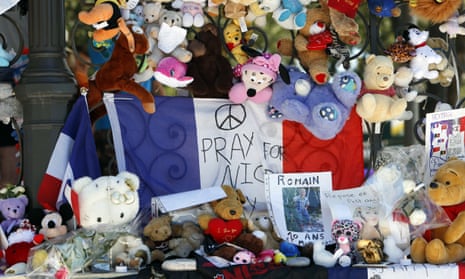Often, when I tell people what I do for a living, they start telling me about journalism they like or don’t like, ask me which “famous” people I have met, or explain to me what I should be writing about. But not lately. Lately they say: “I have had to stop watching the news.” They feel completely overwhelmed and increasingly powerless: Orlando, Brexit, race war, Conservative hegemony, Nice, Trump. Everything is spinning so fast and changing so rapidly that they describe a kind of data vertigo: there is literally too much information, and just about all of it seems entirely negative. The feelings that much of this information evoke are so unbearable that it sometimes seems really better not to know. I feel this myself. The world is going to hell in a hand cart, so let’s have a barbecue – but don’t mention climate change, that really is a downer.
The option to switch off is, of course, not available to all, but I see so many caught between anxiety and withdrawal, and a mood of deep uncertainty prevails. Out of this flow consequences that we must seek to understand or, in future, we will have even less control than we fear. Some will say that this feeling of precariousness, of the rug being pulled away at any minute, of a future suddenly blotted out, is really only the middle class experiencing the fragility of working-class life, where nothing ever feels that secure anyway.
Some of this is true, but if the Brexit vote showed all kinds of divides, it also showed a predominantly cultural gulf, a deep emotional disconnect. The feeling of being locked out, not spoken for, not valued, a nostalgia for an imagined community; it meant that many felt going it alone would be better than belonging to a world that is whizzing past them. Where have those feelings been reflected by the arts in the past 10 years? When they were expressed, why was it such a shock to all but a few valiant reporters? Why have we refused to know? The cultural establishment pats itself on its liberal back but has managed not to notice that half the country does not share its liberal values. It has not, in its own awful terminology, “reached out” much at all. There are honourable exceptions, but the prevailing views of the cultural establishment are so uniform that they question very little. The job of culture is to show us ourselves, all of ourselves, but clearly some of us are still more equal than others.
This was brought home by the deaths of so many working-class heroes this year too. We mourn the loss of Victoria Wood and Caroline Aherne, not just because they were geniuses – they were – but because the conditions that created them no longer exist. Art and drama schools are now finishing schools, and the idea that culture may tell us something we didn’t already know is vanishing. The theory that it was, in fact, David Bowie’s presence in the universe that was holding everything together is one I find hard to resist, given how awful everything has been of late.
Yet I don’t want to give in to the current spiral of anxiety. Anxiety smothers reason, and so any certainty feels like air. But beware this rush to certainty for, while politics presents itself as rationality, we have just caught it in flagrante, acting out a psychodrama and riven with ego, delusion, repressed hatred and a will to power.
Faced with the actual loss of control, all these feelings were shut down again as Theresa May was made prime minister. We are all to see this as the most natural, indeed, necessary thing in the world. If Brexit revealed the strong undercurrent of what the French call “insécurité”, then it looks like May will be in power for a very long time. We don’t yet know how her brand of authoritarian populism will work, but we do know that it is not only rooted in economic inequality but is a backlash against liberal social values. Liberalism itself is, of course, so often blamed for causing this general mood of anxiety in the first place.
In the midst of this cultural, political and economic panic, all-consuming narratives – such as the story of a strong leader who can take care of everything – are swallowed whole. This is happening in Europe and, as we can see, in the US too. Entirely false promises are being made, but this is a fantasy that comforts many. It is a fantasy of withdrawal from a globalised world, stopping the free movement of people and labour.
The real challenge for anyone vaguely liberal/left is to counter this, not with some old-school internationalist vision, but with something that is both local and modern, that accepts there is anxiety instead of telling people they are simply wrong and stupid to feel it, or that it is some kind of false consciousness.
The answer to anxiety, both personally and politically, is not to withdraw, however tempting that may be, but the opposite: it is to engage. “Stop the world, I want to get off” doesn’t really work as an individual strategy or a policy guide, because the world just doesn’t stop turning. And we turn with it.

